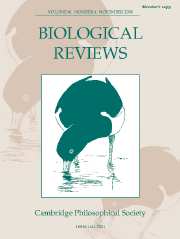Article contents
The coevolutionary dynamics of obligate ant social parasite systems – between prudence and antagonism
Published online by Cambridge University Press: 04 February 2005
Abstract
In this synthesis we apply coevolutionary models to the interactions between socially parasitic ants and their hosts. Obligate social parasite systems are ideal models for coevolution, because the close phylogenetic relationship between these parasites and their hosts results in similar evolutionary potentials, thus making mutual adaptations in a stepwise fashion especially likely to occur. The evolutionary dynamics of host–parasite interactions are influenced by a number of parameters, for example the parasite's transmission mode and rate, the genetic structure of host and parasite populations, the antagonists' migration rates, and the degree of mutual specialisation. For the three types of obligate ant social parasites, queen-tolerant and queen-intolerant inquilines and slavemakers, several of these parameters, and thus the evolutionary trajectory, are likely to differ. Because of the fundamental differences in lifestyle between these social parasite systems, coevolution should further select for different traits in the parasites and their hosts. Queen-tolerant inquilines are true parasites that exert a low selection pressure on their host, because of their rarity and the fact that they do not conduct slave raids to replenish their labour force. Due to their high degree of specialisation and the potential for vertical transmission, coevolutionary theory would predict interactions between these workerless parasites and their hosts to become even more benign over time. Queen-intolerant inquilines that kill the host queen during colony take-over are best described as parasitoids, and their reproductive success is limited by the existing worker force of the invaded host nest. These parasites should therefore evolve strategies to best exploit this fixed resource. Slavemaking ants, by contrast, act as parasites only during colony foundation, while their frequent slave raids follow a predator–prey dynamic. They often exploit a number of host species at a given site, and theory predicts that their associations are best described in terms of a highly antagonistic coevolutionary arms race.
Keywords
- Type
- Review Article
- Information
- Copyright
- 2005 Cambridge Philosophical Society
- 102
- Cited by




